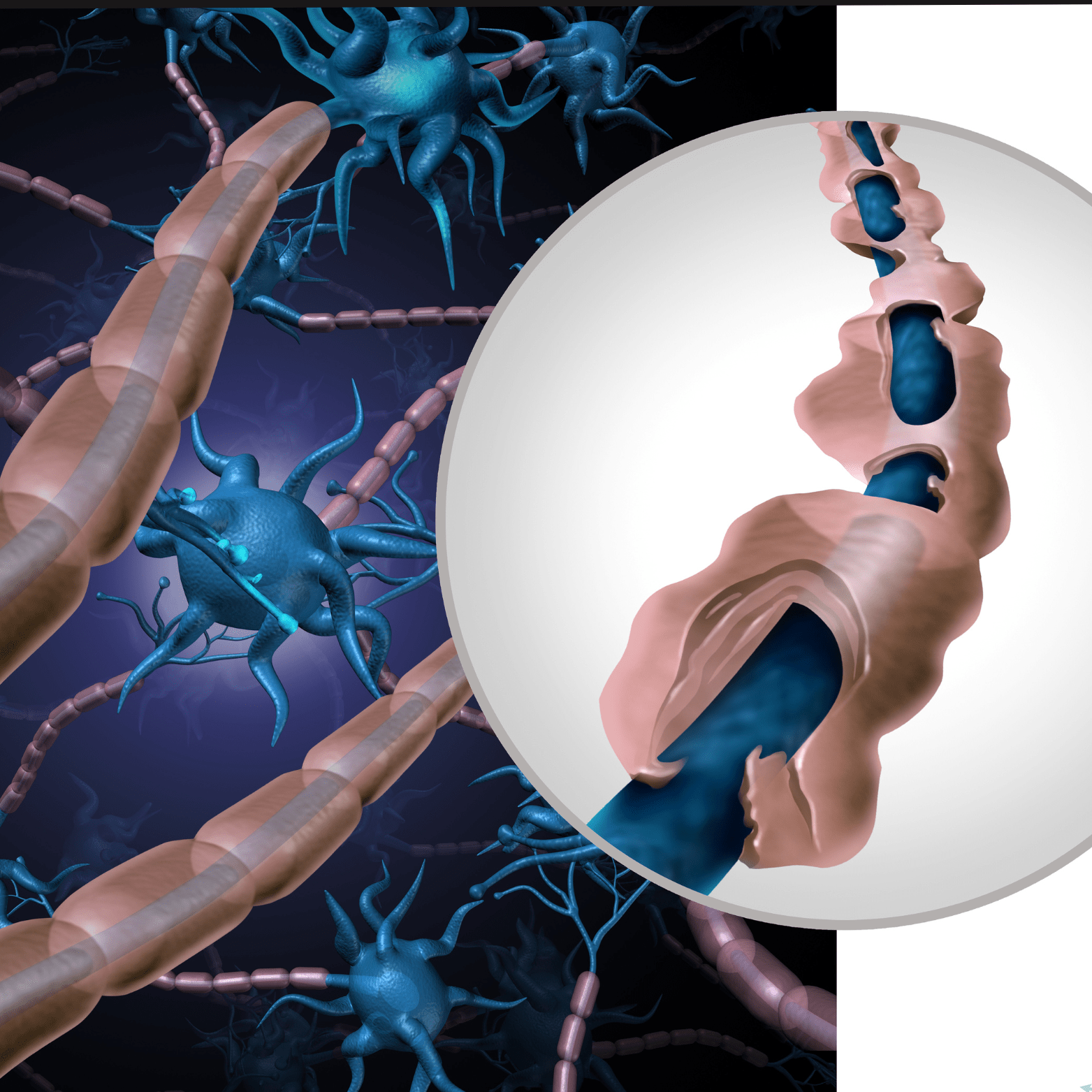Multiple Sclerosis
content of this page
1- Introduction
2- Pathophysiology
3- Symptoms
4- Treatment
Introduction
Multiple Sclerosis (MS) is a chronic autoimmune disease that affects the central nervous system (CNS), which includes the brain and spinal cord. In MS, the immune system mistakenly attacks the protective myelin sheath that covers nerve fibers, causing inflammation and damage. This damage disrupts communication between the brain and the rest of the body, leading to a wide range of symptoms that can vary greatly among individuals. Common symptoms of MS include fatigue, weakness, numbness or tingling, vision problems, difficulty with coordination and balance, and cognitive changes.

Pathophysiology
The pathophysiology of Multiple Sclerosis (MS) involves complex interactions between the immune system, the central nervous system (CNS), and genetic and environmental factors. Here’s a detailed explanation:
Immune System Dysfunction: MS is considered an autoimmune disorder where the immune system mistakenly attacks the myelin sheath, a fatty substance that surrounds and insulates nerve fibers in the CNS. Myelin is essential for the efficient transmission of nerve signals.
Inflammatory Response: Immune cells, particularly T cells, are activated and cross the blood-brain barrier into the CNS. Within the CNS, these immune cells release cytokines and other inflammatory molecules that contribute to inflammation and damage to the myelin sheath.
Demyelination: The inflammation leads to demyelination, which is the loss or damage of the myelin sheath. Demyelination disrupts the transmission of nerve signals along the affected nerve fibers. This can result in various neurological symptoms depending on which part of the CNS is affected.
Axonal Injury: In addition to demyelination, there can also be damage to the nerve fibers (axons) themselves. This axonal injury further contributes to the neurological deficits seen in MS patients.
Plaque Formation: Over time, areas of demyelination and axonal injury can lead to the formation of plaques or lesions in the CNS. These plaques are visible on MRI scans and are characteristic of MS.
Remyelination: In some cases, there may be attempts at remyelination, where damaged myelin is repaired. However, remyelination is often incomplete and less effective as the disease progresses.
Neurodegeneration: Chronic inflammation, demyelination, and axonal injury eventually lead to neurodegeneration, where nerve cells themselves are damaged or destroyed. This contributes to the progressive nature of MS and can lead to irreversible disability over time.

Symptoms
Visual Disturbances: Blurred vision, double vision (diplopia), or loss of vision in one eye. Optic neuritis, inflammation of the optic nerve, is a common early symptom.
Sensory Changes: Numbness or tingling sensations, often in the face, arms, legs, or trunk. This can be unilateral or bilateral.
Motor Symptoms: Weakness or stiffness in the limbs, difficulty walking (gait instability), tremors, or coordination problems (ataxia).
Fatigue: Overwhelming fatigue that is not relieved by rest, often reported as one of the most debilitating symptoms of MS.
Cognitive Changes: Difficulty concentrating, memory problems, slowed thinking, and other changes in cognitive function.
Bladder and Bowel Dysfunction: Problems with urinary urgency, frequency, hesitancy, or retention. Constipation or bowel incontinence can also occur.
Emotional and Mood Changes: Depression, anxiety, mood swings, and emotional lability (rapid changes in emotions).
Pain: Chronic pain, including neuropathic pain (burning or electric shock-like sensations) and musculoskeletal pain.
Speech and Swallowing Difficulties: Slurred speech (dysarthria) or difficulty swallowing (dysphagia) due to muscle weakness.
Heat Sensitivity: Many individuals with MS experience worsening of symptoms with heat exposure, such as during hot weather or with hot showers.
Treatment
reatment of Multiple Sclerosis (MS) aims to achieve several goals: managing symptoms, slowing disease progression, treating relapses, and improving overall quality of life. Treatment plans are often personalized based on the type of MS, the severity of symptoms, and individual patient needs. Here are key components of MS treatment:
Disease-Modifying Therapies (DMTs):
- DMTs are medications that can help reduce the frequency and severity of relapses, delay progression of disability, and reduce the number of new lesions seen on MRI scans.
- Examples include interferon beta medications (such as Avonex, Rebif), glatiramer acetate (Copaxone), dimethyl fumarate (Tecfidera), fingolimod (Gilenya), and others.
- Newer therapies, such as monoclonal antibodies (ocrelizumab, alemtuzumab), target specific immune cells involved in MS.
Symptomatic Treatments:
- Medications to manage specific symptoms such as muscle spasms (baclofen, tizanidine), bladder dysfunction (anticholinergics), neuropathic pain (gabapentin, pregabalin), and fatigue (amantadine, modafinil).
- Physical therapy and exercise programs to improve strength, balance, and mobility.
- Occupational therapy to help with activities of daily living and adaptive equipment.
Acute Relapse Treatment:
- Corticosteroids (such as methylprednisolone) are often used to shorten the duration and severity of relapses (also known as exacerbations or attacks).
- Plasma exchange (plasmapheresis) may be considered for severe relapses that do not respond to steroids.
Management of Symptoms:
- Treatment for specific symptoms like urinary dysfunction, cognitive impairment, spasticity, and mood disorders can significantly improve quality of life.
- Supportive care, including counseling, support groups, and education about coping strategies.
Lifestyle Modifications:
- Strategies to manage heat sensitivity, such as cooling vests or avoiding hot environments.
- Dietary recommendations to maintain overall health and manage symptoms.
Monitoring and Regular Follow-Up:
- Regular neurologic examinations, MRI scans, and other tests to monitor disease activity and treatment effectiveness.
- Adjustments to treatment plans based on disease progression and individual response to therapies.
Comprehensive Care:
- Multidisciplinary care involving neurologists, nurses, physical therapists, occupational therapists, psychologists, and social workers to address the complex needs of MS patients.